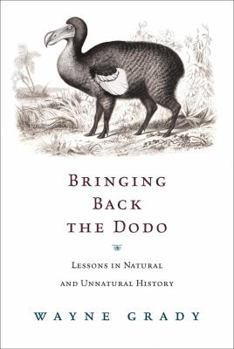Bringing Back the Dodo: Lessons in Natural and Unnatural History
Select Format
Select Condition 
Book Overview
This is a strikingly thought-provoking book about how the forces of evolution and extinction have shaped the living world, and the part that humans play therein. These elegant and penetrating essays... This description may be from another edition of this product.
Format:Hardcover
Language:English
ISBN:0771035047
ISBN13:9780771035043
Release Date:March 2006
Publisher:McClelland & Stewart
Length:233 Pages
Weight:1.00 lbs.
Customer Reviews
1 rating
Grady's great goal
Published by Thriftbooks.com User , 18 years ago
We must give Wayne Grady full marks for ambition. When his editor wished to elevate him to "the Canadian David Quammen", Grady upped the ante. He wants to be the "John McPhee" of The Great White North. That's about as lofty as you can get. Does he succeed? Does this book herald a replacement for The New Yorker magazine's eclectic journalist? The topics are varied and interesting. Grady explains them clearly and earnestly, with flashes of dry wit. In his "First Words" introduction, Grady demonstrates his desire to set new patterns. He notes that this collection relies on his columns in "explore" magazine without simply reprinting old material. He has expanded and updated the original material, sometimes overly restricted in lengths and deadline limitations. These, he says, are essays, not merely retread columns. Further, he wishes to have these essays seen as a "single voice" addressing a "unified theme." The voice is his and the theme is that humanity considers itself detached from the remainder of the world. That, he stresses, is an attitude that must be overcome. The theme, thus, is a reconsideration of where evolution has left our species in the natural order of things. Technology, in its various forms, has allowed this one species to inhabit nearly all the planet, Grady says. Instead of adapting to the local environment, Homo sapiens has learned how to change its surroundings to suit itself. Agriculture remade land use. Various animals were brought into our communities and put to work or on the table. Darwin's natural selection has been replaced by artificial selection of both plants and animals. More, these technologies now have a global reach and impact. Technology now brings to our table products from Mexico and Africa. Is this innovative practice the result of our sub-tropical origins? Do we need these "exotic" foods to survive?, he asks. We are going beyond the changing of some species to our design, however. We are eliminating species we deem "harmful" in some way. Killing wolves and coyotes was almost a daily ritual for herdsmen a few years ago. It still is for some. Grady's account of the Harters, a retired couple who chase coyotes with a pick-up and a dog team is stomach-wrenching. Their motive, "It keeps us young" beggars comment. The modern capacity to assign guilt by proximity led to the killing of a cougar suspected of attacking a jogger. It was the wrong cougar. Our desire to limit the world we must cope with goes beyond a few geriatrics chasing coyotes or slaughtering predators until we find the one that may have attacked a human. We are expanding our denial of life's diversity into government policy. Grady quotes his hero: "Nature has become an enemy of the state". Grady wants at least an armistace, if not a peace. Grady isn't contending we give up the benefits our evolved intellect has granted us. His articles on health and dealing with natural threats show his broad approach. It's n





